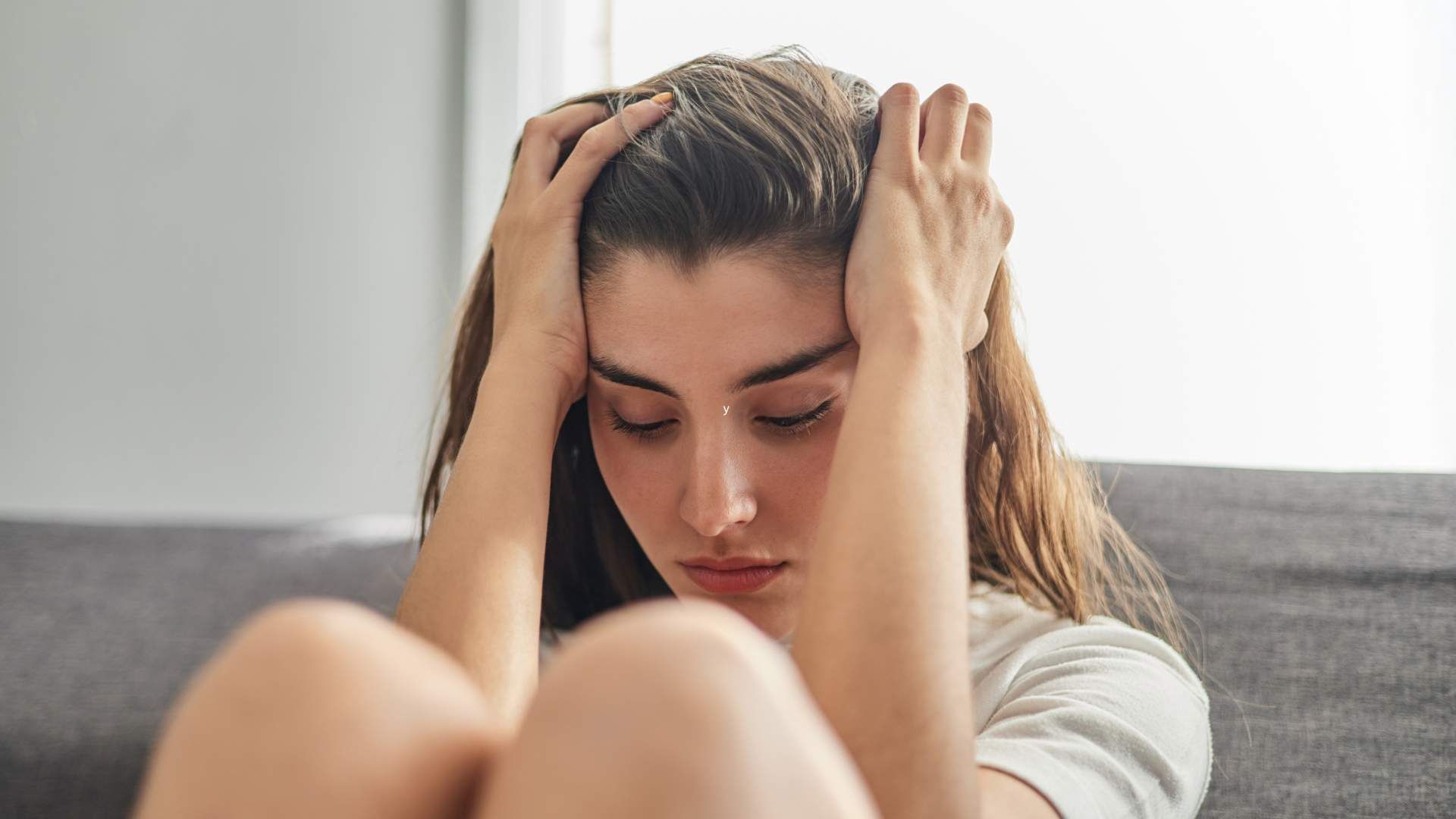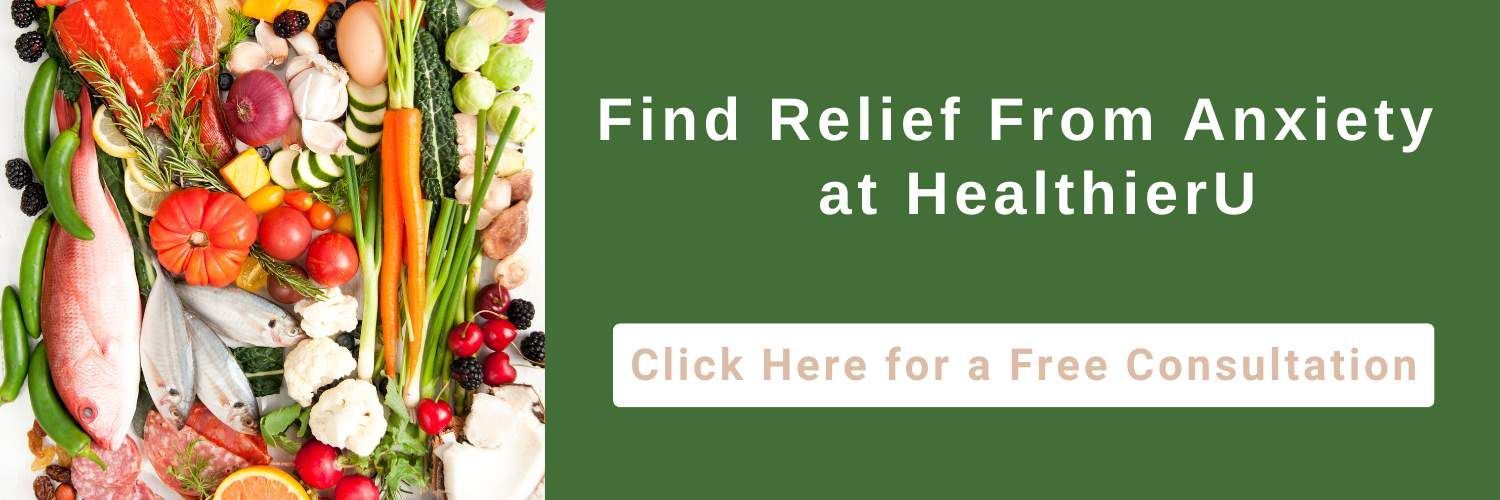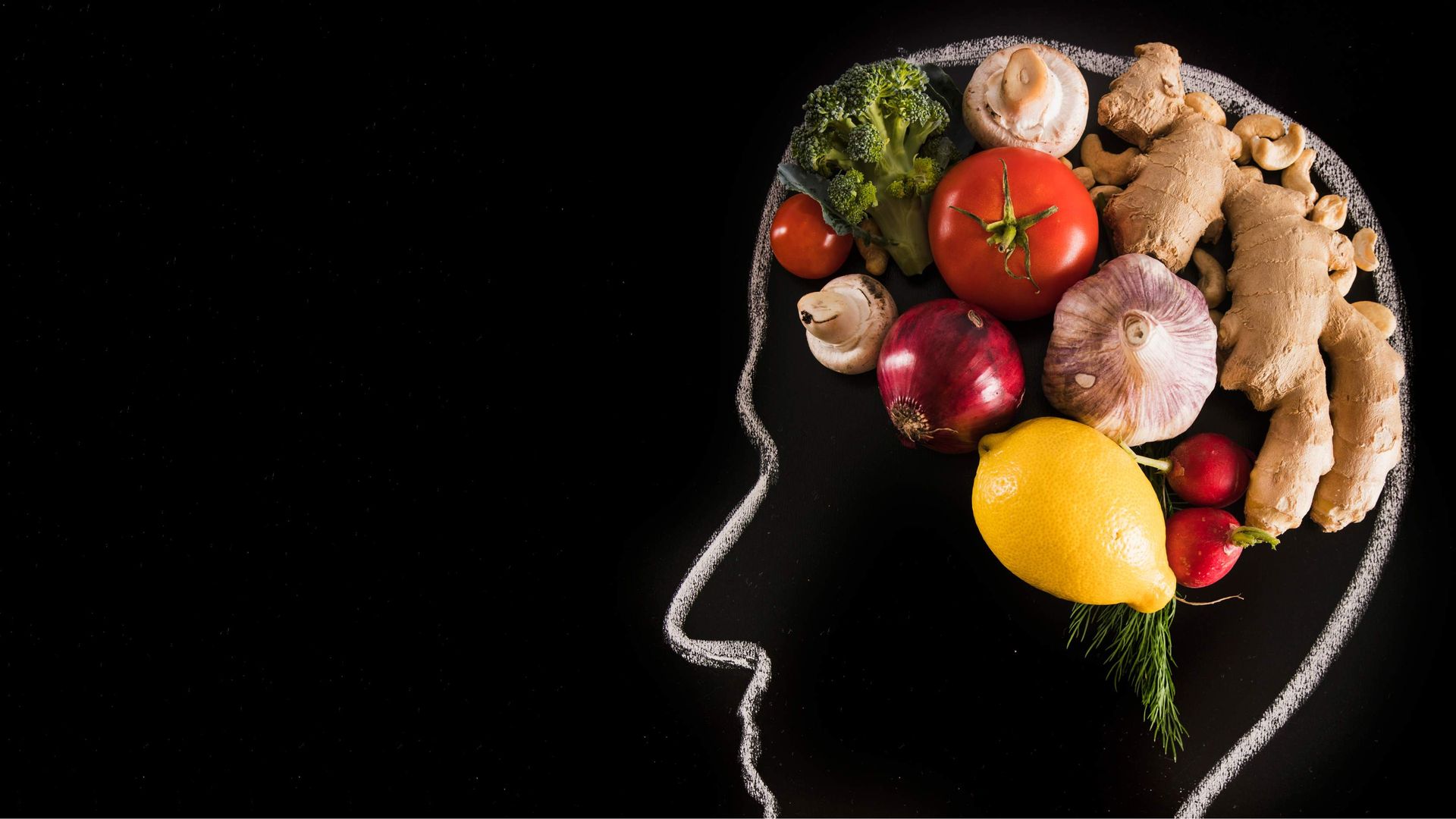Anxiety and Nutrition: Does What You Eat Make a Difference in How You Feel?
"The content below is not intended to be a substitute for professional medical advice, diagnosis, or treatment. Always seek the advice of your physician or other qualified health provider with any questions you may have regarding a medical condition."
Your heart rate is increasing. You’re having trouble controlling your thoughts. A sense of panic is beginning to take over.
But why?
There seems to be no external reason for what you’re experiencing. There’s no real present danger. But the feelings are real — and the anxiety is very real.
If you experience anxiety, you’re not alone. But there is hope. Science shows that choosing the right nutrition for your body can improve the quality of your mental health.
Learn here how nutrition and anxiety are related and what foods to focus on to fuel both your body and mind.
Table of Contents
How Does Nutrition Affect Anxiety?
Being deficient in certain minerals and vitamins can affect the biochemical balance in your brain — resulting in or increasing your anxiety. On the other hand, evidence indicates that a general balanced diet can decrease anxiety symptoms.
In order to fully understand how nutrition can impact mood and mental health, it’s important to first address how mood and mental health impact nutrition.
Anxiety can decrease your appetite. This can result in a lower intake of essential nutrients that the body needs. If you’re experiencing anxiety, you may need increased amounts of certain nutrients to counteract the chronic stress your body may be experiencing.
Can Lack of Nutrients Cause Anxiety?
Yes, anxiety and nutritional deficiencies are related. Nutrient deficiency can not only cause or worsen anxiety, but anxiety can also decrease nutrient levels. Our bodies need sufficient nutrients to maintain physical and mental health.
Overall, evidence indicates that a general balanced diet can decrease the symptoms of anxiety.
The nutrients with the most success in scientific trials to help improve anxiety are:
- Antioxidants
- Protein; and
- Vitamin B-6
6 Foods To Include in Your Diet To Reduce Anxiety
Following a nutrient-dense diet may help some people manage their anxiety symptoms.
Overall dietary intake — along with therapy and medication if needed — can be a helpful tool for anxiety management.
There are many foods you can eat that may help support brain function and lower the severity of your symptoms, mostly due to their brain-boosting properties. We’ve included six of those here for you to consider as good nutrition for anxiety.
#1: Eggs
Eggs are an excellent source of tryptophan, a neurotransmitter that helps create serotonin and may help reduce anxiety symptoms.
Eggs also contain vitamin D, with around 6% of the recommended Daily Value (DV) in one large egg. Low vitamin D levels may be associated with increased symptoms of anxiety.
Eggs are also a source of complete protein — meaning they contain all the essential amino acids the body needs for growth and development.
#2: Salmon
Salmon contains nutrients that promote brain health — including vitamin D. Vitamin D has been studied for the positive effects in reducing symptoms of anxiety. A meta-analysis showed that vitamin D supplementation was associated with lower rates of negative mood disorders.
Salmon also contains the omega-3 fatty acids:
These nutrients may help regulate the neurotransmitters dopamine and serotonin — which can have calming and relaxing properties and are associated with lower rates of anxiety.
In this study, those who ate Atlantic salmon three times per week for five months reported less anxiety and improved anxiety-related symptoms than those who ate only chicken, pork, or beef.
#3: Dark Chocolate
Dark chocolate contains flavonoids, such as epicatechin and catechin, which are plant compounds that act as antioxidants.
Research suggests that the flavonols found in dark chocolate may benefit brain function. Flavonols may increase blood flow to the brain and enhance cell-signaling pathways. These effects may allow you to adjust better to stressful situations that can lead to anxiety. Researchers also suggest that the role dark chocolate plays in brain health may be due to its taste — which can be comforting for those with anxiety.
Dark chocolate is also a good source of magnesium. Eating a diet with enough magnesium may reduce symptoms of stress and anxiety.
When choosing dark chocolate as nutrition for anxiety, aim for 70% cacao or more.
Dark chocolate is best consumed in moderation — as it’s high in calories and contains sugar. For best results, enjoy a 1 to 1.5-ounce serving at a time.
#4: Green Tea
Green tea contains L-theanine, an amino acid that’s been known to have positive effects on brain health and anxiety.
In this study, participants who had a beverage containing L-theanine reported significantly lower subjective stress and decreased cortisol levels, a stress hormone linked with anxiety.
L-theanine may also increase …
- GABA
- Dopamine; and
- Serotonin
… all neurotransmitters that have been shown to lower anxiety.
Green tea also
contains theanine, an amino acid. Theanine has anti-anxiety and calming effects and may increase the serotonin and dopamine levels.
#5: Complex Carbs
Carbohydrates are thought to increase production of serotonin in your brain, which can have a calming effect and are an excellent source of nutrition for anxiety. Complex carbs, a longer molecular strand, take more time to break down and release sugar into the bloodstream slowly — giving your body more sustainable, long-lasting energy.
Complex carbohydrates includes whole grains such as:
- Oatmeal
- Quinoa
- Brown rice
- Whole-grain breads; and
- Whole-grain cereals
#6: Brazil Nuts
Brazil nuts are high in selenium. Selenium may improve mood by reducing inflammation.
It is important not to consume too much selenium — as it can cause side effects. The recommended upper limit for selenium for an adult is 400 micrograms per day. Be careful not to eat more than three or four Brazil nuts per day.
Brazil nuts are also
good sources of vitamin E, an antioxidant. Antioxidants can be beneficial for treating anxiety. Research has shown that low levels of vitamin E may lead to
anxiety in children.
4 Foods To Avoid To Reduce Anxiety
#1: Caffeine
Caffeinated beverages can make you feel jittery and nervous, especially if you’re not used to it. It can also interfere with sleep — neither of which helps with anxiety.
Beverages that contain caffeine, such as …
- Coffee
- Tea; and
- Energy drinks
… can increase anxiety.
A study on the effects of caffeine and anxiety found that:
Caffeine at doses roughly equivalent to five cups of coffee induces panic attacks in a large proportion of PD (panic disorder) patients and highly discriminates this population from healthy adults. Caffeine also increases anxiety in PD patients as well as among healthy adults at these doses.
#2: Sugar
Drinks such as sodas and fruit juice are typically loaded with sugar.
For example, a 12-ounce can of soda can contain eight to thirteen teaspoons of sugar, depending on the type. Many fruit juices are also loaded with sugar but don't contain the amount of fiber that fruit contains.
You should also be wary of certain store-bought foods. They may not taste sweet but often contain refined sugars.
Be careful of foods like:
- Salad dressings
- Tomato sauce
- Ketchup
- Pasta sauce
- Breakfast cereal
Hidden sugar in foods can drive anxiety.
A study found that of their participants:
Individuals aged under 45 years with a high proneness to anxiety consumed more added simple sugars compared to those with a low proneness to anxiety. In turn, the quantity of fresh fruit intake appeared to be lower among adults aged over 45 years with high versus those with low trait anxiety.
#3: Processed Food
If you eat lots of processed food such as …
- Meat
- Cheeses
- Fried foods
- Refined cereals
- Candy
- Pastries; and
- High-fat dairy products
… you may be more likely to be anxious and depressed.
These foods are associated with inflammation — which can produce anxiety.
Results of a study published in the journal
Public Health Nutrition showed that individuals who consumed a lot of ultra-processed foods had statistically
significant increases in the adverse mental health symptoms of mild depression —
mentally unhealthy and anxious days — when compared with those who consumed a lesser amount.
#4: Alcohol
Alcoholic beverages are considered depressants, which some believe can have a calming effect. However, as alcohol is processed by your body, it can make you anxious.
Some people will use alcohol as an unhealthy coping tool to reduce symptoms of anxiety. But alcohol use can cause new onset anxiety and worsen pre-existing anxiety symptoms.
Alcohol can also interfere with sleep — which can lead to anxiety.
Drinking alcohol can often lead to poor sleep quality and blood sugar spikes, especially if you drink on an empty stomach. Drinking alcohol excessively can lead to dehydration and physical hangover symptoms, which can lead to anxiety.
Collectively, symptoms like …
- Dehydration
- Poor sleep
- Depletion of B vitamins; and
- The alcohol detox process
… can all lead to feelings of anxiousness.
Additional Nutritional Tips for Helping Avoid Anxiety
Eat a High Protein Breakfast
Eating protein at breakfast can help you feel fuller longer and help keep your blood sugar steady — so that you have more energy as you begin your day.
When you make protein-rich foods the focal point of your breakfast (and any meal or snack), you’re less likely to reach for sugary options such as white breads or cereals.
Check for Food Sensitivities
Pay attention to any food sensitivities that could be causing or increasing your anxiety. In some people, certain foods or food additives can cause negative physical reactions.
These physical reactions may lead to shifts in mood — including anxiety.
Discover How To Use Nutrition for Anxiety With Nutrition Response Testing at HealthierU
What you eat becomes fuel for your body and your brain.
We have a good understanding now of the relationship between nutrition and anxiety. At HealthierU, we work to identify and permanently alleviate your anxiety using natural remedies.
If you’re experiencing anxiety, your body knows why. As a specialist in women’s health and wellness, Dr. Donna Sergi listens to what your body is saying through nutrition response testing.
Contact us today to schedule your consultation at our office in Brooklyn, NY.






